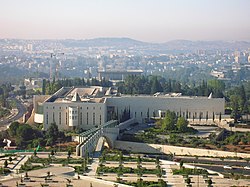The meeting of the Judicial Appointments Committee on Friday turned out to be something of a pleasant anti-climax. In a meeting that lasted only 90 minutes, four new justices were duly appointed to the bench of the Israeli Supreme Court. The cordial nature of the meeting and the appointments seemed to conceal the less-than-cordial path that led to this moment.
Israel's Supreme Court plays a very central role in Israeli society. In addition to acting as an appellate court, it also acts as a High Court of Justice in which decisions by government and state authorities can be challenged and set aside. The right of the Supreme Court to set aside government decisions creates a critical place for it in Israeli democracy. It is little wonder that the appointment of new justices to the bench of this court is such an important and controversial exercise. Once appointed to the Supreme Court, justices serve until they are seventy years of age and cannot be removed except under extreme circumstances. The judges on the bench need to be act independently of government, and need to be seen to act independently of government to maintain their important role as defender of democracy.
For some time now, certain ultra-Orthodox and right-wing citizens of Israel have protested that decisions by the Supreme Court have discriminated against their views and positions. While many Israelis have regarded the court's decisions as representing the voice of reason in situations which have seemed wholly unreasonable, some groups feel discriminated against by these decisions. Surprisingly, it seems as if this view was not only shared by extremists. In the lead-up to the meeting of the Judicial Appointments Committee, the Minister of Justice and the Prime Minister threatened to become caught up in a judicial appointments row. Their actions pointed unashamedly to the fact that they also subscribe to the view that the bench of the Supreme Court has become too left-wing. Certain actions and statements on their behalf attempted to influence the makeup of the Judicial Appointments Committee in the hope that this may influence the appointment of the Supreme Court judges towards their right-wing views.
The nine-man Judicial Appointments Committee includes two members who are appointed by the Israeli Bar Association. The remaining seven members of the committee are made up of three sitting judges of the Supreme Court, two ministers and two members of Knesset. The two Bar Association representatives are chosen in a vote that is conducted according to a simple majority. The two representatives were chosen to the satisfaction of the Bar Association, and this revealed that one representative was somebody known to be politically left of centre. Individuals close to the Minister of Justice embarked upon a campaign to retroactively change the rules by which the Bar Association candidates were selected, in order to replace the left-wing representative. It was hoped that this would ensure that the right-wing candidates to the bench would be appointed. This attempt to undermine the due process of appointment of justices is shameful, and can be seen as an attempt to meddle with an important arm of the democracy of our nation. No person is larger than the system, and no individual should be allowed to undermine the operation of a process that is so fundamental to the democracy of the country.
Ultimately, the attempts to change the rules retroactively were unsuccessful, and the original vote of the Bar Association stood. Their two representatives took their place on the Judicial Appointments Committee and four new judges were appointed. Despite the controversy and shenanigans leading up to the vote, the four new candidates can be seen as typifying compromise and organisation. Justice Noam Sohlberg lives in Alon Shvut on the West Bank, and was elected by eight of the nine committee members as a representative of the right. Justice Zvi
Zylbertal was elected unanimously as a candidate from the left. He is regarded as being very close to retiring Judge President Dorit Beinisch. Justice Uri Shoham was also elected unanimously, and is seen to represent those of North African and Middle Easter (Mizrachi) origin. Finally, Justice Daphne Barak-Erez received unanimous support as the only female new judge.
Whereas in the USA, the appointment of judges is a highly politicised process and is a good way for presidents to leave a legacy long after the end of their presidential term, in Israel this has not been the case until now. It may, however be set to change in the future, even though it seems as though this would be an unfortunate development. Due to the fact that the Israeli Supreme Court is frequently called upon to adjudicate matters which have strong political overtones, it is important that the bench should be as politically impartial as possible. This is particularly true when living in a society with so many minority groupings. Citizens should feel confident that the Supreme Court will judge fairly and independently on each case that is brought before the court. On this occasion, democracy has ensured that even the Minister of Justice was unable to influence the process of justice. This is real democracy in action.

No comments:
Post a Comment